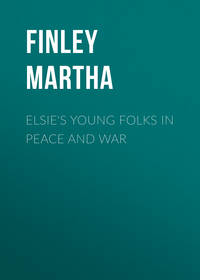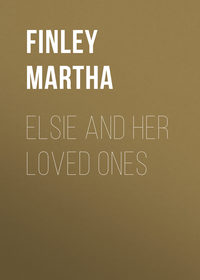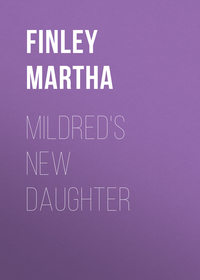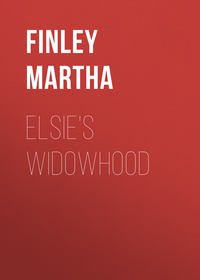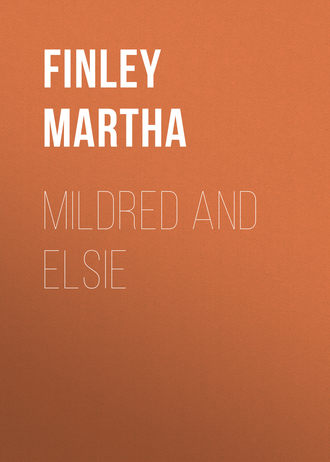 полная версия
полная версияMildred and Elsie
CHAPTER VIII
A DELIGHTFUL SURPRISE"There is a letter, my dear, which concerns you quite as much as myself," Mr. Keith said, putting it into his wife's hand. "It gives information which perhaps, for several reasons, it may be as well for us to keep to ourselves for the present," he added, with a smile. "That is why I kept it back until now that we are alone."
They had retired to their own room for the night, and the little ones who shared it with them were fast asleep.
"From Uncle Dinsmore!" Mrs. Keith exclaimed, recognizing the hand-writing at a glance.
Her husband watched her face with interest and some curiosity as she read, a slight smile on his lips and in his eyes.
She looked up presently with hers shining. "How good, how wonderfully good and kind they always are!"
"Almost too kind," he responded, his face clouding a little. "At least I wish there was no occasion for receiving such favors. I should have been tempted to decline, had I been consulted beforehand. But it would hardly do now that the goods are almost here. We could not well send them back."
"No; certainly that is not to be thought of for a moment," she said, lifting to his, eyes smiling through tears. "We must follow the Golden Rule, Stuart, and accept their kind assistance in educating our children just as we would wish them to accept ours were our situations reversed."
"Yes," he said, heaving a sigh, "doubtless you take the right view of it; but – ah! Marcia, wife, 'it is more blessed to give than to receive.'"
"It is indeed, my dear husband, and we will not refuse them that blessedness now, but receive their kindnesses in the spirit in which they are offered, hoping that we may have our turn some of these days. Shall we not?"
He gave a silent assent. "Do you not agree with me that it will be well to keep the matter a secret from the children until the boxes arrive?" he asked.
"Oh, yes, indeed! we will not let even Mildred know. It will be such a delightful surprise to her, dear child! for though she has uttered no word of complaint, I am sure it must have been a great disappointment to her that you could not furnish her with a piano this fall to enable her to keep up her music. Now she can do that and teach her sisters too."
"And her playing will be a great treat to us all," added Mr. Keith, with a smile that spoke volumes of fatherly affection and pride in his first-born.
"And then the books! what delightful times we shall have over them!" she added, her eyes sparkling; "what a help they will be in cultivating our children's minds! I think our dear girl must have completely won her way into the hearts of my uncle and cousin Horace."
"As her mother did before her," he responded, with a light happy laugh.
When preparing to leave Ohio for the wilds of Indiana, Mr. Keith had sold most of their heavy articles of furniture, among them the piano. Its loss had been greatly lamented in the family, especially by the older girls and Rupert. The purchase of another had become a darling project with him, and to that end he had worked and saved till he had now quite a little hoard, earned mostly by the sale of fruits, vegetables, and fowls of his own raising; his mother paying him for these at the market price, and whatever surplus he had finding ready sale at the stores.
The lad was very industrious and painstaking, generally very successful in what he undertook – as such people are apt to be – and while generous to others spent little on himself.
Since Mildred's return, the desire for a piano was stronger than ever: there was not one in the town, nor an organ, or any kind of keyed instrument; so that there was no chance for them to hear her play and judge of her improvement; and worse still, she would be in danger, from want of practice, of losing all she had gained. But pianos cost a great deal in those days, and Mr. Keith could not just now spare the money to make the purchase and pay the heavy cost of transportation.
Money was scarce in that region then, business carried on very largely by barter. This made it easier for him to be at the expense of enlarging his house than to pay for something that must come from a distance.
There was little or no fretting or complaint over this state of things, but the children often talked longingly of the good time coming, when father would be able, with the help of what they could earn and save, to send for a piano.
That time seemed to be brought a little nearer by an act of thoughtful kindness on the part of their dear Aunt Wealthy. She had set apart from her income a certain sum which she engaged to send to their mother, at regular intervals, to be divided among them as pocket-money. The dear old lady could hardly have devised anything that would have given more pleasure. The news, as announced by Mildred on the day of her arrival, was received with demonstrations of wild delight, and evidently the little ones now considered themselves moneyed individuals, taking great pride and pleasure in consulting together, or with father and mother, as to the disposal of their incomes.
This opened up to the careful Christian parents a new opportunity for the study of the natural character of each of their children, and the curbing of wrong inclinations, whether toward extravagance or penuriousness.
One day, several weeks after Mildred's return, Rupert came in near the dinner hour, and drawing his mother aside, whispered something in her ear. There was a look of covert delight in his face, and his eyes sparkled as he added, "One's long, low and broad, mother; can only be one thing, I think – just the thing we're all wanting so much. But where could it come from?"
"Where do you suppose?" she answered merrily. "Well, the instant you are done your dinner you may go down and see them brought up."
"But father said it was your wish and his to make it a complete surprise to the children."
"Mildred included?" laughed his mother; "you are so much older than she. I will manage it. They shall all be out of the way while we unpack."
Mr. Keith came in presently, and with his arrival the call to dinner.
Mildred looked curiously at Rupert several times during the meal, wondering at his unaccustomed air of importance, the half-exultant, meaning glance he now and then sent across the table to one or the other of their parents, and the haste with which he swallowed his food and hurried from the table and the house, having asked to be excused, as he had business of importance to attend to.
"Dear me, what airs!" laughed Zillah, as he whisked out of the room. "One would think he was a man, sure enough."
"Girls," said Mrs. Keith, "I want you to take the little ones out for a walk this afternoon. It is a bright day and the walking good, and if you are all well wrapped up, you will not feel the cold."
"Not if they go at once," put in Mr. Keith.
"Run away and make yourselves ready, all of you."
"The party will be large enough without me, won't it, mother?" queried Mildred. "You know I have a piece of sewing on hand that I am very desirous to finish before night."
"Let it go, child; you need air and exercise far more than I do the dress," was the kind and smiling rejoinder.
Then came a chorus of entreaties from all the children that mother would go too.
But she would not hear of it, had a matter of importance to attend to at home; perhaps, if to-morrow should prove pleasant, she would go with them then.
And so with smiles and merry, loving words she helped to make them ready and sent them on their way.
Barely in time, for hardly were they out of sight when a wagon drove up with two large, weighty looking boxes. Rupert and two men, beside the driver, were in the vehicle also, and it took all their strength, with Mr. Keith's added, to lift and carry the boxes into the house.
"Oh, it is a piano! I know it is!" cried Rupert, as they set down in the hall the box he had described to his mother.
"A pianer did ye say?" queried one of the men, as for a moment they all stood panting from their exertions and gazing down upon the burden they had just deposited upon the floor. "Let's get it open quick then, for I never see one in my life."
Rupert ran for the hatchet, and in another five minutes the lid was off the box, and all remaining doubt vanished.
"It is, it is!" cried the lad, fairly capering about the room in his delight. "Oh, what a joyful surprise for the girls and all of us! But where on earth did it come from? Father – "
"I had nothing to do with it, my son," Mr. Keith asserted with a grave earnestness that precluded the idea that he might be jesting.
The boy looked bewildered, then disappointed. "There's been some mistake, I'm afraid. Perhaps there's another family of our name somewhere in this region, and – "
But his mother whispered a word in his ear and his face grew radiant. "Is that it? O mother, how good they are!"
"Let's git the thing out and see what it's like," said the man who had spoken before.
The others eagerly assented, and set to work at once, Mr. Keith giving assistance and directions, Mrs. Keith pointing out the place in the parlor where she wished it to stand.
"You kin play, I 'spose, Mrs. Keith. Won't you give us a tune?" was the eager request when their task was ended.
Smilingly she seated herself and played "Yankee Doodle" with variations.
They were delighted. "First-rate!" commented the one who seemed to act as chief spokesman of the party. "Now, ma'am, if you please, won't you strike up 'Hail Columby.'"
She good-naturedly complied, added "Star Spangled Banner," then rose from the instrument.
They thanked her warmly, saying they felt well paid for bringing "the thing" in.
"You must come in again some day, if you enjoy hearing it," she said with gracious sweetness. "I think you will find my daughter a better performer than I am."
"Yours is plenty good enough for us," they answered, bowing themselves out.
"It is a very sweet-toned instrument," she remarked, running her fingers over the keys; "a most magnificent present. How delighted Mildred and the rest will be!"
"I am eager to witness it," her husband said with a smile. "It is indeed a most valuable gift, and nothing could have been more acceptable."
"They're the kindest, most generous relations anybody ever had," added Rupert emphatically. "What's in that other box? shan't we open it now?"
"Books," answered his mother. "Yes, we may as well open it and spread them out ready for Mildred's inspection. Most of them belong to her."
This done Mrs. Keith again seated herself at the piano.
The young people had taken a pretty long walk, moving briskly to keep themselves warm, for the November air was frosty, and were now returning in gay spirits, eyes sparkling and cheeks glowing with health and happiness, while the tongues of the little ones ran fast, and a joyous shout or a silvery laugh rang out now and then; for the greater part of their way lay not through the streets of the town, but on its outskirts – along the river bank, through the groves of saplings, and over still unoccupied prairie land. When they came where there were houses and people to be disturbed by their noise, their mirth subsided a little, and they spoke to each other in subdued tones.
As they drew near home, unaccustomed, surprising sounds greeted their astonished ears.
"Oh, what's that music?" cried the little ones, "such pretty music!"
"Why, it sounds like a piano!" exclaimed the older ones; "but where could it come from?" and they rushed tumultuously into the house, even Mildred forgetting the staid propriety of her years.
The parlor door stood open, and – yes, there it was – a beautiful piano, mother's skilful fingers bringing out its sweetest tones, father and Rupert standing enraptured close beside her, and Celestia Ann, sleeves rolled up, dish-towel in hand, eyes dancing, and mouth stretched in a broad grin, stationed at the farther end.
"Well, I never! where on airth did the critter come from?" she exclaimed just as the others came upon the scene. "I never see the like, I never did!" she went on. "I just ran down town of an arrant, and I'd come home again and in the back door and begun to wash up them dishes, when I heered this agoin', and come in to find out what under the sun was agoin' on."
But no one seemed to hear a word she said; the children were jumping and careering about the room in frantic delight, clapping their hands, pouring out questions and exclamations. "Oh, aren't you glad? aren't you glad?" "Isn't it a beauty?" "It's just too nice for anything!" "Who did send it?"
Mildred stood silently gazing at it, her eyes full of glad tears. Father and Rupert were watching her, taking no notice of the others.
"Well, dear?" her mother said, whirling about on the piano stool and looking up into her face with tender, loving eyes.
"O mother, it is too much!" she cried, the tears beginning to fall. "Uncle Dinsmore sent it, I know; and I do believe it's one of the very two I liked the best of all we saw. He bought the other for themselves and this for us."
"For you, dear; but indeed it is, he says, not his own gift, but Cousin Horace's. The books are from him – our kind, generous uncle." And she pointed to them where they lay piled high upon the table.
"Books too!" Mildred exclaimed in increased astonishment and delight.
"Yes, he has marked out a course of reading for you – subject to your father's and my approval – and sent the necessary books and some others beside."
While his wife was speaking Mr. Keith had drawn near and put an arm about Mildred's waist; and now she fairly broke down, and hiding her face on her father's shoulder, sobbed aloud.
The children were immediately awed into silence. They gathered around her, asking in half-frightened tones, "Milly, Milly, what's the matter? are you sorry the piano's come? We thought you'd be so glad."
"And so I am," she said, lifting her head and smiling through her tears.
Her mother vacated the stool, her father seated her thereon, and hastily wiping away her tears, she sent her fingers flying over the keys in a lively merry tune that set the children to jumping and dancing more wildly than before.
CHAPTER IX
"Labor in the path of duty,Gleam'd up like a thing of beauty."Cranch."My dear child, you have improved wonderfully," Mrs. Keith said, as Mildred concluded a much longer and more difficult piece of music than the one with which she had begun.
"She has indeed! I'm quite proud of her performance," echoed Mr. Keith.
"She does make terrible fine music," put in Celestia Ann; "but I wisht she'd stop a bit, or them dishes o' mine 'll never git washed."
"And I must go to the office," said Mr. Keith, looking at his watch, and glancing about in search of his hat.
"And I to my sewing," added Mildred, rising.
The children entreated somewhat clamorously for more, but yielded their wish at once on mother's decision that they must wait till after tea.
"Oh, the books!" cried Mildred, springing toward them with an eager gesture. "But no," turning away with a half sigh, "I must not take time to even look at them now."
"Yes, you may," her mother said smilingly; "glance at the titles, and dip in here and there, just to whet your appetite; read this note from your uncle, too, and then we can talk over your plans for mental culture, while busy with our needles."
"Always the same kind, indulgent mother," Mildred said, with a look of grateful love. "I will do so, then, and try to work fast enough afterwards to make up for lost time."
Half an hour later she joined her mother and sisters, who were all sewing industriously.
"Such a nice note, mother. Shall I read it to you?"
"Yes, if you like. I always enjoy uncle's letters."
"It sounds just like his talk," Mildred said when she had done reading, "saying the kindest things half jestingly, half earnestly. But the idea of his thinking I must have wondered that he gave me no special parting gift! – when he was all the time heaping favors upon me."
"But it was Cousin Horace who gave the piano," said Ada.
"Yes; uncle the books. And now I must strive to show my appreciation of their kindness by making the best possible use of both presents."
"For your own improvement and that of others," added her mother. "I want you to lend them, one at a time, to Effie Prescott and poor Gotobed Lightcap."
"What about him, mother?" Mildred asked, taking up her sewing. "The children told me he had been elected sheriff."
"Yes; I was very glad. He deserves every encouragement, for he is trying hard to educate himself, and I really hope some day may be able to enter one of the learned professions."
"Poor fellow!" Mildred exclaimed feelingly, tears starting to her eyes as memory brought vividly before her the sad scenes connected with the loss of his right hand, "he is welcome to the use of any or all of my books. I will gladly do anything in my power to help him."
"Now, suppose we talk about ourselves and our own affairs," Zillah suggested in her sprightly way. "I'm extremely anxious to learn to play on that lovely piano, but don't see how either you, mother, or Milly is to find time to give me lessons, for you are both busy as bees now from morning to night."
"And I want to learn too," put in Ada imploringly.
"So you shall, dears, both of you, if you continue to be the good, industrious, helpful girls you have been for the past year," the mother said, with her cheery smile. "Milly and I will manage it between us. Almost all our winter clothes are made now, so that we will not need to give so much time to sewing as we have for the past month or more."
Mildred seemed to be thinking. "I believe we can manage it," she said presently. "I hear the recitations from nine to eleven now, you know; we must begin at eight after this, and then from ten to twelve can be spared for the two music lessons."
"And the afternoons and evenings you must reserve for yourself – your exercise, study, reading and recreation," added Mrs. Keith, "while I oversee the practicing and the preparation of lessons for the next day. Two music lessons a week to each will be all sufficient. Yes, I am sure that with system and rigid economy of time – making good use of each golden minute as it flies – we can accomplish all that is necessary, if not all that is desirable."
Again a few moments of thoughtful silence on Mildred's part, then, "Mother," she said, "do you think I ought to take that Sunday-school class? I don't feel fit, and – and besides, it will take a good deal of my time to attend right to it – prepare the lessons, and occasionally visit the children through the week."
"I would have you consider the question carefully and prayerfully, and in the light of God's holy word, which is our only rule of faith and practice, daughter. 'As we have therefore opportunity, let us do good unto all men.' 'He that winneth souls is wise.'"
"But, mother, I am not wise."
Mildred's tone was low and humble.
"'If any of you lack wisdom, let him ask of God, that giveth to all men liberally, and upbraideth not; and it shall be given him.' Ask for it and search the Scriptures for it, for we are told, 'The entrance of thy word giveth light; it giveth understanding to the simple.' And while you study it for the benefit of others, you will be cultivating your own soul – a matter of even greater importance than the culture of your intellect."
"And I could not do the first without at the same time doing the last."
"No; that is very true. Also I trust, daughter, that your great motive for improving your mental powers is that you may thus be prepared to do better service to the Master?"
"I hope so, mother; it is, if I know my own heart," Mildred said, looking up with shining eyes. "I know it is said that duties never conflict, yet it does seem sometimes as though they did."
"As, for example?" and her mother's eyes smiled encouragingly and sympathizingly into hers.
"Why, there is the weekly church prayer-meeting to take one whole evening out of the six."
"Only from an hour to an hour and a half," corrected Mrs. Keith.
"But it breaks into the evening so that one can hardly do much with the leavings," Mildred said with a slight laugh. "And then the young girls' prayer-meeting breaks up one afternoon of every week, and besides – O mother! it is a real trial to me to lead in prayer, and I am sure to be called on."
"I hope you will never refuse," Mrs. Keith said gently, and with a tender, loving look. "We should never fear to attempt any duty, looking to God for help, for it shall be given, and a blessing with it."
"It is a great cross to me."
"Greater than that the Master bore for you?"
"Oh no, no! nothing to compare to it, or even to what many a martyr and many a missionary has done and borne for him."
"And is it not a blessed privilege to be permitted to do and bear something for his dear sake?" Mrs. Keith asked with glistening eyes, and in tones trembling with emotion.
"O mother, yes!" And Mildred's head bowed low, a tear fell on her work.
"O my darling, be a whole-hearted Christian!" the mother went on, speaking with intense earnestness, "consecrate yourself and all you have to the Master's service – time, talents, influence, money – everything you possess. He gave himself for us; shall we hold back anything from him?"
"Oh no! But mother – "
"Well, dear?"
"Shall I not do better service by and by, perhaps, by now giving my whole time, energy, and thought to preparation for it?"
"Do you find that you can always do a given amount of mental work in a given space of time?"
"No, mother; sometimes my brain is so active that I can do more in an hour than at some other times I can accomplish in a day."
"And cannot He who made you, and gave you all your mental powers, cause them at any time to be thus active? My child, he never lets us lose by working for him; in some way he will more than make it good to us. 'He that watereth shall be watered also himself.' 'Seek ye first the kingdom of God, and His righteousness; and all these things shall be added unto you.'"
Mildred looked up brightly. "I think – I am sure you are right, mother; and I will take up all those duties, trusting to the dear Master to help me with them and with my studies. My time is his as well as all else that I have."
"'Yes, ye are not your own, for ye are bought with a price; therefore glorify God in your body and in your spirit, which are God's.'"
"Who, mother?" asked little Fan, playing with her doll near by.
"All God's children, my child."
"I want to be one, mother. But who bought them? and what with? what price?"
"Christ bought them, dear, with his own precious blood."
"Mother," said Ada softly, "how good he was! I wish I could do something for him; but I'm not old enough to teach in Sunday-school, or pray in the prayer-meeting."
"No, darling; but you can pray at home, kneeling alone in your own room, and join with your heart in the prayers at family worship and at church; you can pray in your heart at any time and in any place; for yourself and for others. In his great kindness and condescension God listens to our prayers at all times, if they come from the heart, and just as readily to those of a little child as to those of the wisest and mightiest of men."
"O mother, I'm glad of that! but if I could do some work for him I'd love to do it."
"Do you remember, dear, that once when Jesus was on earth the people asked him 'What shall we do that we might work the works of God?' and Jesus answered and said unto them, 'This is the work of God, that ye believe on him whom he hath sent.'"
"That was Jesus himself," the child said thoughtfully, staying her needle in mid air, while her eyes sought the floor. "Mother, could you tell me just what is meant by believing on him so as to be saved? It can't mean only believing all the Bible says about him is true, because it tells us 'the devils also believe, and tremble.' I heard father read it from the Bible at worship this morning."
"Yes, my dear child, it does mean much more than that," the mother said, and silently asked help of God to make it clear to the apprehension of all present, even to little Annis, who leant confidingly against her knee, the blue eyes gazing earnestly into her face.


